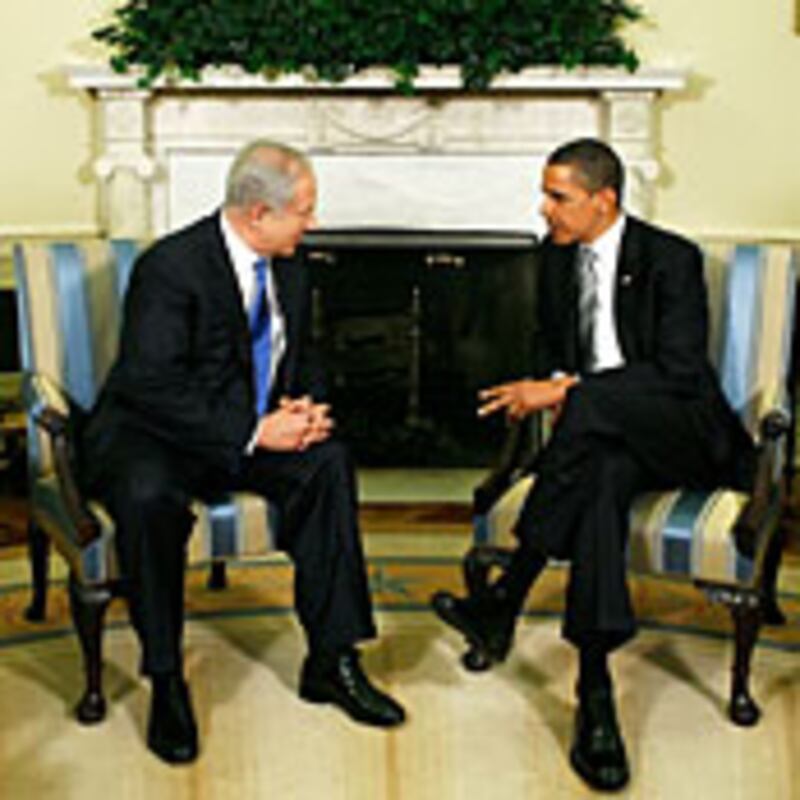
President Obama asserted that the United States’ relationship with Israel is “unbreakable” after meeting with Israeli Prime Minister Benjamin Netanyahu on Tuesday. “The U.S. will never ask Israel to do anything that undermines its security,” Obama said. He said that Israel “wants peace” with the Palestinians and that its decision to lift some of the blockade of Gaza represents “real progress.” Netanyahu, meanwhile, said the talks were “extensive and excellent” and that the peace process will move forward in a "very robust way" in the "next few weeks." Meanwhile, Israeli sources tell Dan Senor they worry a wrong signal coming out of today’s White House meetings could grind the peace process to a halt by September.
Benjamin Netanyahu’s visit to the White House on Tuesday was to have been a simple affair: a glorified photo-op with President Obama to make up for the contentious—and, for the Israeli prime minister, humiliating—meeting in March. But because it will be the last time Netanyahu and Obama will meet face-to-face before September, the agenda has become impossibly crowded.
With all the complexities converging between now and September, the most important thing Obama could do Tuesday is to project in both symbolic and substantive ways the durability of the U.S.-Israel alliance, and express his commitment to Israel’s security and to his personal partnership with Netanyahu. Right now, most Israelis have serious doubts.
In our recent conversations, the most graphic image Israeli officials used to describe the Iran situation was of multiple runners racing on a track, each showing progress in a separate area.
If the wrong message comes out of Tuesday’s meetings, a perfect storm of events leading up to September could set the stage for the total collapse of the peace process. Why has that month become so important? Four reasons:
The Palestinians. The Arab League gave Palestinian President Mahmoud Abbas a September deadline to conclude the proximity talks with Israel; he will need the Arab world’s “permission” to continue the talks. The notion that the Palestinians need the blessing of regional autocrats is sad, and underscores the Groundhog Day nature of the entire peace process. Other Palestinian leaders struggled to break away from subordination to the Arab League and establish true Palestinian nationalism, but Abbas’ relationship with his patrons takes the process back to the early 1990s, pre-Oslo. If the Arab League does not grant an extension, the talks will be off.
• Thaddeus Russell: Does Israel Make Us Safer?• Peter Beinart: Obama, Don’t Go Wobbly on IsraelIran. The International Atomic Energy Agency is meeting for a conference in September at which the status of Iran’s nuclear program is sure to come up. In my recent conversations, the most graphic image Israeli officials used to describe the situation was of multiple runners racing on a track, each showing progress in a separate area. The nuclear program runner measures Iran’s progress developing a nuclear weapon; the regime runner measures efforts to change the Iranian regime; the sanctions runner measures the international community’s sanctions efforts; and the other-options runner measures the viability of other options that key countries are considering, including the military option.
At this point, Israeli officials say the “nuclear program runner is leading the race.” The “sanctions runner” registered moderate progress over the last month with the approval of U.N. Security Council sanctions, E.U. follow-up, and congressional legislation. While the congressional legislation is strong, compliance from other countries, especially China, will be weak. And while the Security Council sanctions have global buy-in, they are not comprehensive, with a negligible impact on Iran’s energy sector.
Most worrisome, say Israeli officials, is the “regime change runner,” at a virtual standstill because of the suppression of the Iranian opposition movement. The “other-options runner” is on hold while key international actors measure the impact, if any, of the sanctions effort.
The United Nations. Turkey takes over as chair of the U.N. Security Council in September. Once an important ally of Israel’s, the republic has taken a decidedly aggressive turn against its former partner. Meanwhile, the U.N. Human Rights Council will likely take up the Goldstone Report—the inflammatory investigation of Israel’s conduct in the 2008 Gaza War—again in September, putting Israel on the defensive. The U.N. General Assembly also will convene in September and take up the flotilla operation.
Israeli politics. Netanyahu’s governing coalition of 78 Knesset members remains strong and his approval ratings are decent. But Labor Party Knesset members who support withdrawing from the coalition are becoming more vocal. The party’s ruling committee is to examine the state of the peace process in September and then decide whether its leader, Defense Minister Ehud Barak, should pull Labor’s stakes out of the government. Some Israeli officials have said Netanyahu’s meeting with Obama on Tuesday will define the future of the peace process, and therefore the future of Labor within the coalition.
Similarly, whether center-right Kadima leader Tzipi Livni and her 28 Knesset members join the government rests on her evaluation of Netanyahu’s intentions to move ahead in the peace process. Livni has conditioned entering the government on being given responsibility for Palestinian negotiations.
From Netanyahu’s right flank, some of his ministers are looking at the same month for determining their longevity as partners—the expiry date of the settlements moratorium on Sept. 26. If the building freeze is extended, which of the more conservative parties will remain in Netanyahu's coalition is an open question.
***
So before the storm in September, Obama must reassure Netanyahu. If the past couple decades of Middle East history are any guide, one necessary, but not sufficient, factor for a real peace process is a strong relationship between the Israeli prime minister and his American counterpart, based on mutual trust.
Yitzhak Rabin would never have taken the risks he took in the 1990s for the Oslo process if he did not trust President Clinton. Ariel Sharon would never have unilaterally withdrawn from the Gaza Strip in 2005 were it not for his personal bond with President Bush.
If Obama wants to head off what could be a September train wreck for Middle East diplomacy, he must first cement his partnership with Netanyahu today, and explain it in no uncertain terms to Israel’s friends and adversaries around the world.
Dan Senor, a professional investor, is an adjunct senior fellow at the Council on Foreign Relations and author of Startup Nation: The Story of Israel's Economic Miracle. From 2003-2004, he was based in Baghdad as a senior adviser to the U.S.-led Coalition in Iraq.





